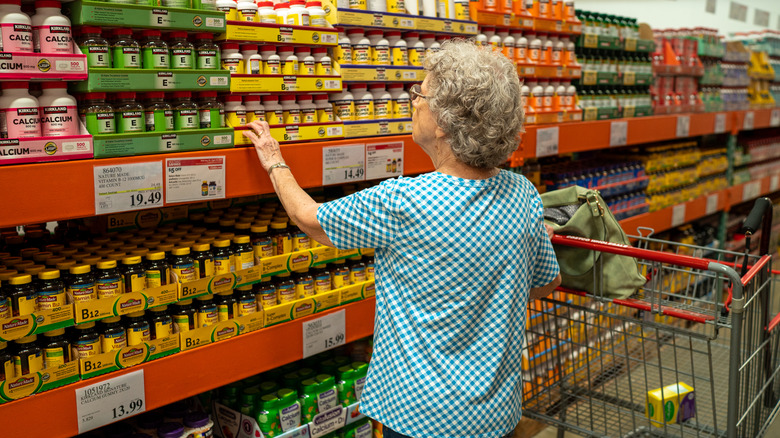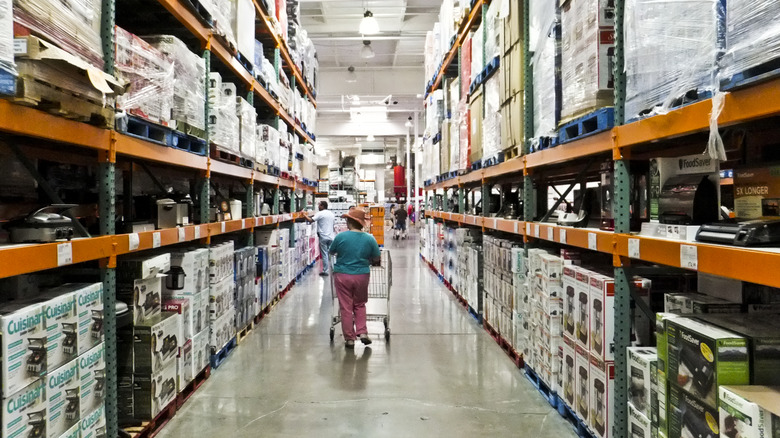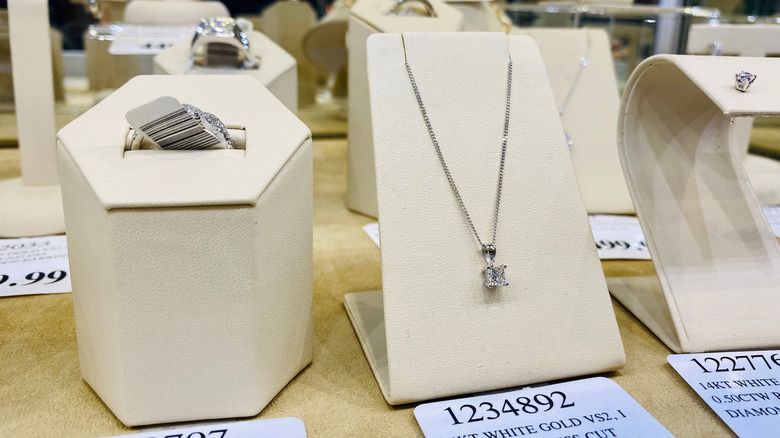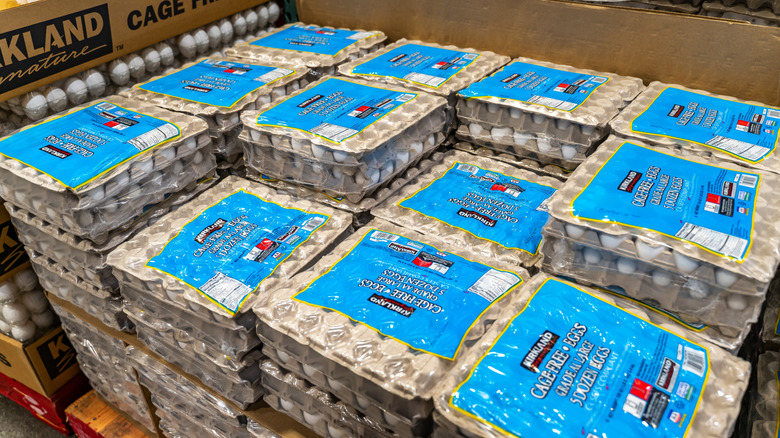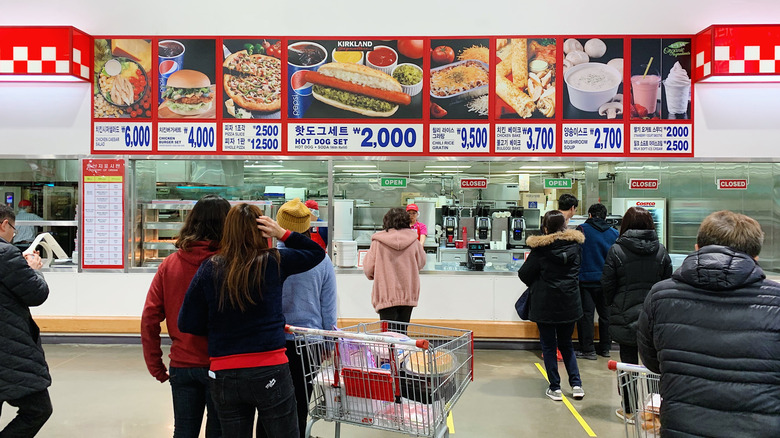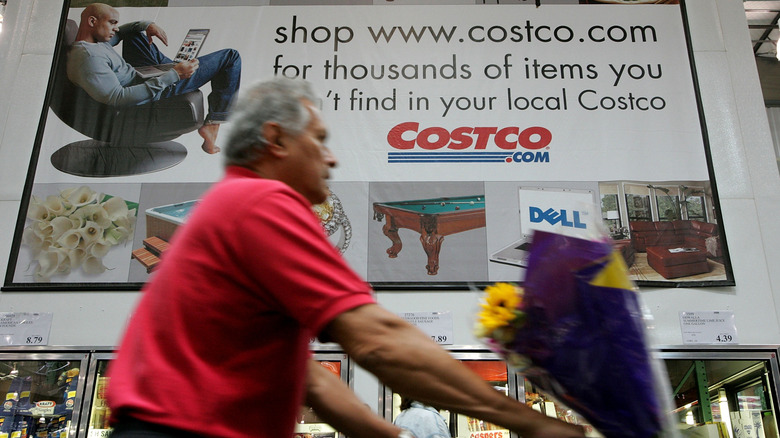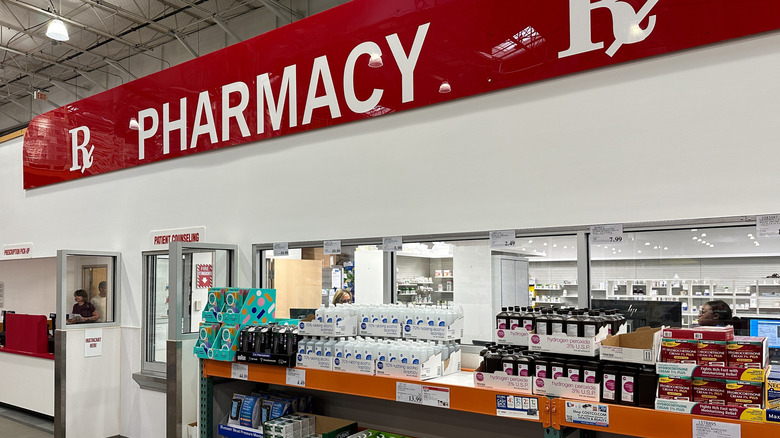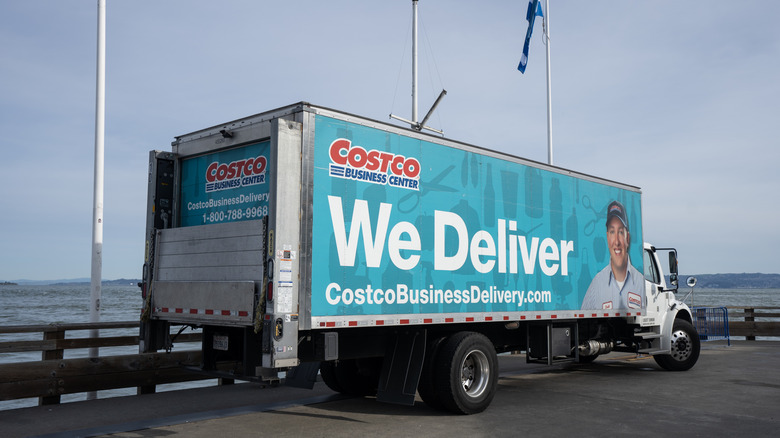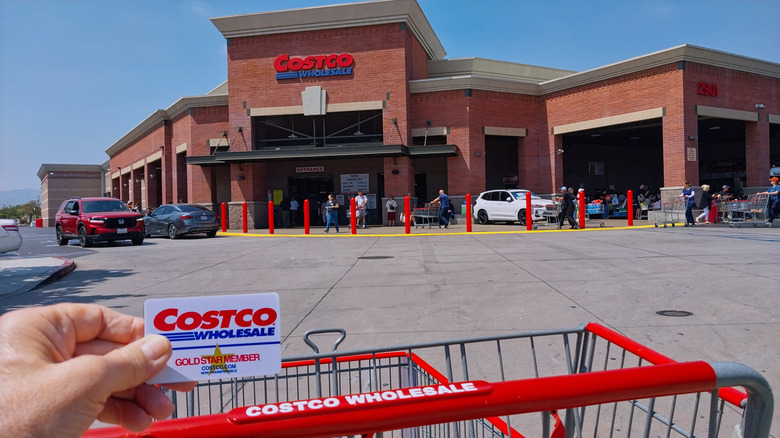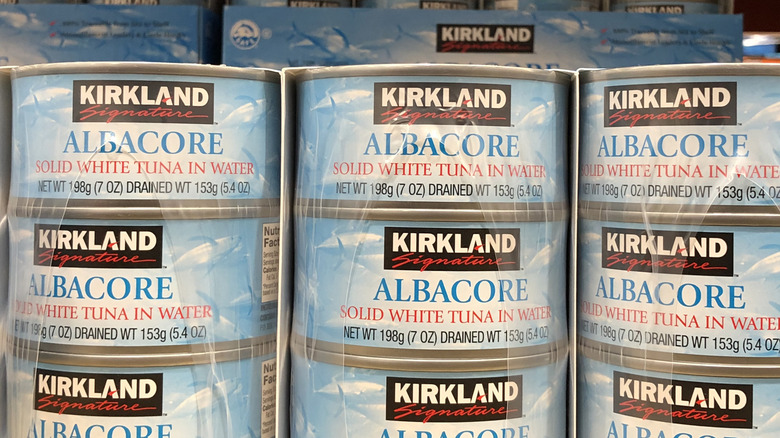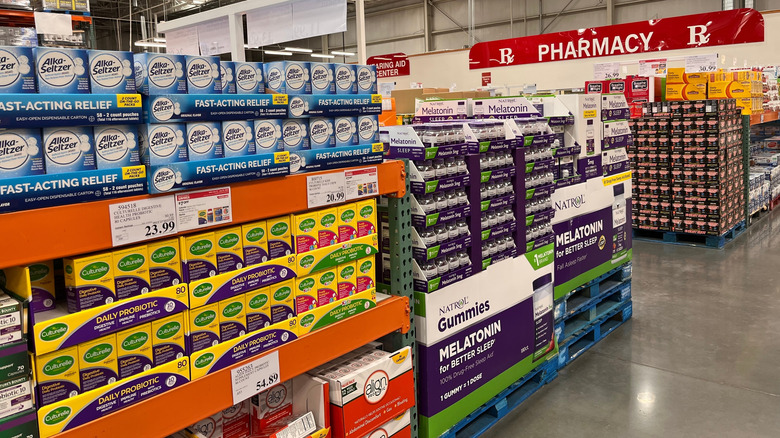Costco's Worst Secrets Exposed
Bargain hunters love it, those prone to sensory overload avoid it like the plague, and anyone who morally opposes shopping somewhere that charges you $60 for the honor will never step foot inside the store. We're talking, of course, about Costco. As of 2024, this membership warehouse club has toppled Trader Joe's as America's favorite supermarket, having lured in its loyal clientele by selling bulk items at discounted prices. It doesn't hurt that it also sells $1.50 hot dogs and has a reputation for being a worker-friendly business (what seems like an increasingly rare phenomenon nowadays) with one of the highest minimum wages in retail.
But that doesn't mean the chain doesn't have a few unsavory secrets. Like the majority of global corporations, Costco has experienced its fair share of controversies over the years. While some of these have been pretty mild, or even common tricks of the trade in the industry, others have much more serious repercussions, with Costco facing legal action and hefty fines. Of course, all of these secrets have surfaced at some point, such is the way of the 21st century. However, that doesn't mean Costco wants everyone to know its dirty laundry — which is exactly what we're sharing right now. Here are some of Costco's shadiest secrets-turned-scandals.
The store is arranged to confuse you on purpose
If you've ever found yourself wandering aimlessly through Costco, passing the same tower of toilet paper to find the soda you could've sworn was there last time, we have some good news. As it turns out, our sense of direction doesn't just evaporate the moment we step into Costco. The chain intentionally plans its stores to be confusing, moving things around on a regular basis.
This doesn't come from some sick desire to watch us all stumble around bewildered for hours on end. Instead, it's a strategic ploy implemented by Costco to keep us discovering and adding new items to our cart (and trying a few free samples en route) as we try to find what we really need. As a former Costco employee wrote on Quora, "They purposely move products around to different locations and are constantly rotating a certain percentage of their inventory to new products. This creates a 'treasure hunt' experience as you shop and helps you discover new products that you may not normally see on your shopping visits."
That's not the only way Costco tricks shoppers into spending more money. According to CBS News, the store puts all of its fresh food at the back of the store, so you have to pass other items to get there. To keep us wandering as long as possible, it also doesn't use signs for the aisles. In other words, we're all just puppets on Costco's strings.
Costco was once accused of selling fake jewelry
Back in 2013, Costco made a very powerful enemy: Tiffany & Co. The feud began when the chain sold diamond rings labeled as "Tiffany" for Valentine's Day, despite the fact that there was no connection to the famed luxury jewelers. Tiffany & Co. sued Costco in federal court for trademark infringement, providing email evidence that Costco had purposely tried to make its ring boxes look like Tiffany's, and hearing from a buyer that some customers were confused by the Costco jewelry. Meanwhile, Costco filed a countersuit arguing that the idea of a "Tiffany" setting for diamond rings has become a generic term in the market, kind of like Kleenex, aspirin, and kerosene.
After an eight-year legal battle, the two parties finally came to an agreement in 2021. While Costco was found liable in 2017, a judge later threw out the $21 million judgment. The case was turned over to an appeals court, which claimed that the 3,349 customers who bought the rings were smart enough not to assume that they were buying an actual Tiffany & Co. diamond ring (the most expensive of which can cost well over $20,000). While neither ever explicitly described the terms of their settlement, a lawyer for Costco told CNBC that they had "amicably resolved their dispute." Still, we wouldn't expect to find discounted Tiffany & Co. in-store any time soon.
Costco's cage-free eggs may not be entirely ethical
Like a lot of grocery stores, Costco has made big promises in regards to improving the ethics of its eggs. Back in 2006, only 2% of all eggs sold in-store were cage-free. By 2022, that percentage had soared to 97%. However, in the 16 years in between, Costco found itself embroiled in controversy after a video revealed the conditions in which the chickens that produced these eggs actually lived "cage-free."
Animal advocacy group Direct Action Everywhere shared the footage, taken at a cage-free farm in California that supplied eggs for Costco's private label brand, Kirkland. The footage in question showed that while the chickens did indeed live cage-free, the conditions were still far from ethical. Dead chickens were strewn on the floor, while injured chickens were pecked by their barn mates. "There was one dead bird that seemed to have lost her head," said Wayne Hsiung, one of the activists who produced the video (via The Seattle Times). "There were birds attacking birds, and the smell was horrible."
Costco issued its own response to the video, claiming that it had "reinspected the barn and other operations of this supplier" and was "comfortable with the animal-welfare aspects of the operation." Since then, Costco has pledged to ditch caged eggs entirely (although it's still yet to make this a reality). Judging by videos that have since emerged from cage-free farms supplying other grocery stores, the industry itself also still requires much more ethical progress.
Some of Costco's international locations have been accused of poor working conditions
Over 40 years after the first Costco opened in a converted airplane hangar in San Diego, the chain is a global operation. Today, you can find Costco stores in locations as far-flung as the U.K., New Zealand, China, and Taiwan. However, just because they share the same name doesn't mean every international Costco shares the same positive reputation as its U.S. counterpart.
In 2023, Costco Korea was called into a parliamentary hearing after one of its workers died of heatstroke. Kim Dong-ho was tasked with organizing shopping carts when he passed away during a heat wave. During the hearing, attendees heard how the Costco branch allegedly lacks rest areas and temperature control measures to protect its workers. It was also claimed that Costco boasts the highest workplace accident rates of all major Korean retailers.
Costco's Korean country manager, Cho Min-soo, denied a failure to protect its employees. However, Kim's brother, Kim Dong-joon, pointed to a lack of empathy from the company in the wake of the tragedy, claiming that "all we got was a short, impersonal apology email" and that "during [his] brother's funeral, Cho and the Hanam branch manager even questioned the employees about any preexisting health conditions" (via Korea JoongAng Daily). Cho insisted that Costco Korea was actively working to address worker concerns, but employees staged strikes in 2024 amid claims that the company had failed to resolve any issues.
Costco has a history of discrimination accusations
Costco may have won awards as an employer, but it's also been named in multiple discrimination lawsuits. One of the biggest started in 2002, when one worker named Shirley Ellis filed a complaint with the U.S. Equal Employment Opportunity Commission, claiming that the company had denied her the role of store manager. In retaliation for making her complaint, Ellis was transferred to a different store, increasing her commute to up to four hours per day.
Two years later, Ellis and over 700 other women who also felt professionally discriminated against due to their gender filed a class-action lawsuit — one that ultimately saw class members compensated by Costco. The company also agreed to work with an independent consultation to implement a new promotion procedure free of gender bias.
Accusations of other forms of discrimination have also surfaced over the years, with one former worker awarded over $1.8 million total in damages after Costco failed to accommodate her anxiety following a traumatic work trip to Mexico. In 2024, Costco was also ordered to pay over $2 million after illegally terminating a 77-year-old employee — who had worked as a Costco pharmacist for over 22 years — due to his age. That same year, another worker filed a lawsuit claiming that he was subject to racial discrimination and retaliation during his time working at a Costco location in Chicago, where he alleged that his supervisors made multiple racially offensive comments.
Costco's pharmacies have been accused of improperly filling prescriptions
Between 1999 and 2019, nearly 500,000 Americans died from an opioid overdose. Multiple efforts have been made to tackle the ongoing opioid crisis in the U.S., including tightening the rules and regulations around opioid prescriptions and dispensing. Big names such as Walmart, Walgreens, and CVS have all paid settlements over their roles in oversupplying opioids, with Costco also coming under fire in the late 2010s.
In 2017, the warehouse chain paid $11.75 million over claims that it had violated the Controlled Substances Act by improperly filling prescriptions for controlled substances, opioids included. Costco had been accused of filling incomplete prescriptions, as well as dispensing substances even when the prescription lacked a valid DEA number (the number allocated to medical practitioners by the Drug Enforcement Agency) or fell outside a doctor's realm of expertise. Costco's records of its controlled substances were also allegedly inaccurate.
While Costco told Retail Dive that it "believes that at no time did its conduct put at risk the health or safety of our members or the public," the U.S. Department of Justice clearly thought otherwise. "A company such as Costco that distributes a significant volume of controlled substances has a responsibility to ensure it complies with regulations that help prevent opioids and other dangerous drugs from being misused," U.S. Attorney Annette L. Hayes said in a public statement (via the Office of Public Affairs).
The chain has been linked to multiple cases of unethical labor
It's thought that one in five children in underdeveloped countries takes part in child labor, while 27.6 million people are subjected to forced labor. For major corporations with complex supply chains, that means labor scandals are all too common — even when their websites boast a mission statement pledging to rid their supply chains of unethical labor.
Costco is no exception. In 2015, a lawsuit claimed that it was aware of slave labor in its prawn supply chain in Thailand. While this case was later thrown out when a judge claimed that the "plaintiffs [failed] to allege [Costco] had a duty to disclose the information about labor abuses in the supply chain ... on its product packaging" (via Reuters), Costco faced more questions in 2023 over links between its seafood and forced labor in China.
That same year, The New York Times alleged that migrant children were working for one of Costco's dairy suppliers. Underage workers have also been found in the sanitation teams of slaughterhouses providing Costco with meat. Some of those involved in forced labor linked to Costco aren't even human. In 2020, Costco dropped Theppadungporn Coconut Co. as its coconut milk supplier after PETA investigators claimed to have found evidence of forced monkey labor at some of its farms and facilities in Thailand.
Costco has shared customer health data without consent
Whether it's chatting to your friends or scrolling through TikTok, the reality is that we share our data on a daily basis. However, that doesn't necessarily give the recipients of said data permission to reshare it as they please. That's why so many customers were shocked in 2023, when four Costco pharmacy patients filed a lawsuit claiming that the store had been doing just that.
As per court documents, Costco installed Meta Pixel — an analytical tool from Meta, the group behind Facebook and Instagram — on its website. This technology tracks the activities of website visitors, which means Meta Pixel gained access to customers' personal data, plus some "highly personal health information" (via New York Post). While it's typically used to help businesses like Costco keep track of their advertising performance, the big question was why Costco would be doing that on a part of its website where customers keep track of their prescriptions, search for medications, and check their insurance co-pay information.
The complaint noted that Costco "represents to patients that its website, which includes its pharmacy webpages, is a secure platform and that the information provided therein will remain protected and confidential." It seems like the judge agreed; in November 2024, it was declared that Costco must face a class-action lawsuit.
Costco engaged in deceptive advertising methods
There are around 4,000 items in a Costco at any given time, but if recent history is anything to go by, you may not want to always take every detail on the label at face value. In 2023, Costco was sued over false and deceptive advertising after labeling its Kirkland Signature White Albacore Tuna in Water as "Dolphin Safe." As per a class-action lawsuit, "the grim reality is that the Products are sourced using fishing methods that seriously injure and kill thousands of dolphins and other marine life each year," making Costco's claim fraudulent under California's Consumers Legal Remedies Act (CLRA).
That same year, Costco Australia was ordered to pay a fine of AUD $33,000 (USD $21,300) after it sold lobsters under the promise that they were from Australia when, in reality, they had been imported from Canada. In 2024, Costco faced a class action lawsuit over claims that it misrepresented the safety and chemical composition of its baby wipes. While the wipes were labeled as being free from harmful chemicals, plaintiffs argued that they actually contained PFAS (per- and polyfluoroalkyl substances) chemicals, which have been known to pose potential health risks even at low levels. Costco also paid out $2 million in a separate wipe-related lawsuit in 2024 after its Kirkland Signature Moist Flushable Wipes — which were marketed as flushable — damaged the plumbing of customers who purchased them between 2011 and 2017.
Costco has accepted millions in illegal kickbacks from drug companies
Kickbacks are a big deal in the pharmaceutical industry. The term refers to the unethical — not to mention often illegal — practice of doctors or pharmacists accepting incentives from a company in exchange for prescribing or stocking their products. Studies have also found that kickbacks (also known as rebates) tend to drive up the cost of generic drugs, passing the burden on to those in need.
In 2018, Costco's operations in Canada faced kickback accusations after a salesman from a generic drug brand called attention to $1.2 million of payments. It emerged that two Costco pharmacy executives had demanded the illegal payments from Ranbaxy Pharmaceuticals. CBC's "The Fifth Estate" later secured footage that showed a Costco executive saying, "As a minimum, I'd like to see somewhere around 3.6 million of support. That's a minimum."
Both executives named in the case, Joseph Hanna and Lawrence Varga, pleaded guilty in front of the Ontario College of Pharmacists, admitting that the payments could "reasonably be regarded by members of the profession as unprofessional" (via Canadian Legal Information Institute). While the pair were fined CAD $20,000 (USD $14,300) and ordered to pay an extra CAD $30,000 (USD $21,400) in costs, Costco was also slapped with an additional CAD $7.2 million fine (USD $5.1 million) a year later after the Ontario Ministry of Health found that it had accepted that much in kickbacks at 29 pharmacies between 2013 and 2015.
